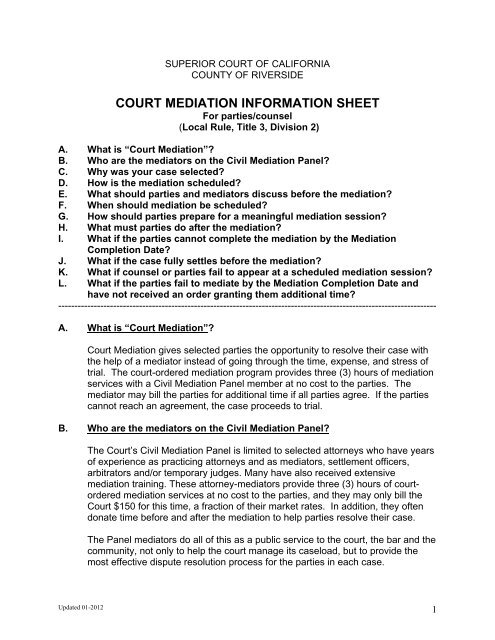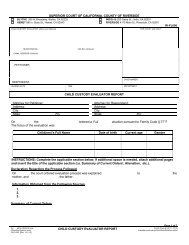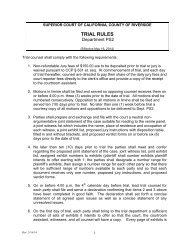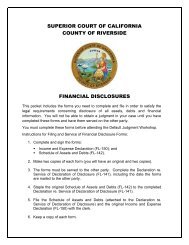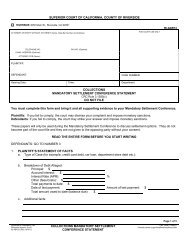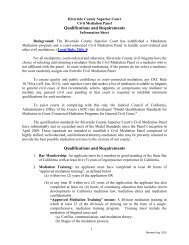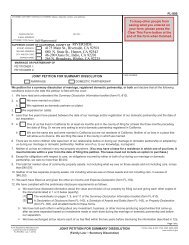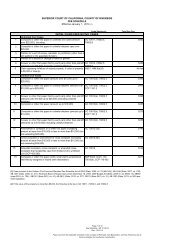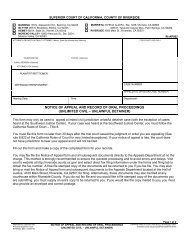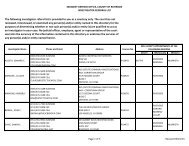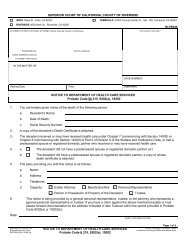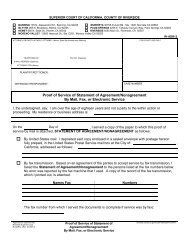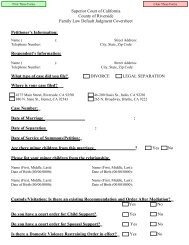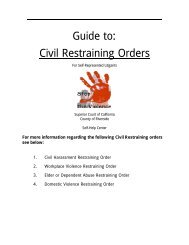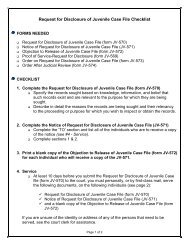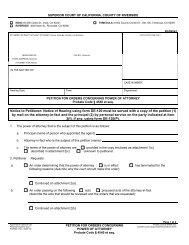court mediation information sheet - Superior Court, Riverside
court mediation information sheet - Superior Court, Riverside
court mediation information sheet - Superior Court, Riverside
You also want an ePaper? Increase the reach of your titles
YUMPU automatically turns print PDFs into web optimized ePapers that Google loves.
SUPERIOR COURT OF CALIFORNIACOUNTY OF RIVERSIDECOURT MEDIATION INFORMATION SHEETFor parties/counsel(Local Rule, Title 3, Division 2)A. What is “<strong>Court</strong> Mediation”?B. Who are the mediators on the Civil Mediation Panel?C. Why was your case selected?D. How is the <strong>mediation</strong> scheduled?E. What should parties and mediators discuss before the <strong>mediation</strong>?F. When should <strong>mediation</strong> be scheduled?G. How should parties prepare for a meaningful <strong>mediation</strong> session?H. What must parties do after the <strong>mediation</strong>?I. What if the parties cannot complete the <strong>mediation</strong> by the MediationCompletion Date?J. What if the case fully settles before the <strong>mediation</strong>?K. What if counsel or parties fail to appear at a scheduled <strong>mediation</strong> session?L. What if the parties fail to mediate by the Mediation Completion Date andhave not received an order granting them additional time?---------------------------------------------------------------------------------------------------------------------A. What is “<strong>Court</strong> Mediation”?<strong>Court</strong> Mediation gives selected parties the opportunity to resolve their case withthe help of a mediator instead of going through the time, expense, and stress oftrial. The <strong>court</strong>-ordered <strong>mediation</strong> program provides three (3) hours of <strong>mediation</strong>services with a Civil Mediation Panel member at no cost to the parties. Themediator may bill the parties for additional time if all parties agree. If the partiescannot reach an agreement, the case proceeds to trial.B. Who are the mediators on the Civil Mediation Panel?The <strong>Court</strong>’s Civil Mediation Panel is limited to selected attorneys who have yearsof experience as practicing attorneys and as mediators, settlement officers,arbitrators and/or temporary judges. Many have also received extensive<strong>mediation</strong> training. These attorney-mediators provide three (3) hours of <strong>court</strong>ordered<strong>mediation</strong> services at no cost to the parties, and they may only bill the<strong>Court</strong> $150 for this time, a fraction of their market rates. In addition, they oftendonate time before and after the <strong>mediation</strong> to help parties resolve their case.The Panel mediators do all of this as a public service to the <strong>court</strong>, the bar and thecommunity, not only to help the <strong>court</strong> manage its caseload, but to provide themost effective dispute resolution process for the parties in each case.Updated 01-20121
The <strong>Court</strong> could not offer this <strong>mediation</strong> program without this generous supportfrom the bar. As parties who have received the opportunity to work with a CivilMediation Panel member at no cost, you can also contribute to the success ofthis program simply by showing respect to the mediator and the <strong>mediation</strong>process and by assisting the mediator with the scheduling and other preparationfor your <strong>mediation</strong> session.C. Why was your case selected?The judge determined that:1. Your case may be ordered to judicial arbitration or <strong>mediation</strong> because it isvalued at $50,000 or lessAND2. Mediation will be more effective than judicial arbitration in your case. Inarbitration, the arbitrator decides who wins and how much money he/sheshould receive. Any party that is not satisfied with the arbitrator’s rulingcan ask for a trial. In <strong>mediation</strong>, the mediator does not decide who wins orloses. Instead, the mediator helps the parties discuss the case and workout a final settlement agreement.D. How is the <strong>mediation</strong> scheduled?Step 1:Step 2:The <strong>court</strong> will send the “Notice of <strong>Court</strong>-Ordered Mediation” and a“Response to Notice of <strong>Court</strong>-Ordered Mediation” to the attorneys/selfrepresentedparties in your case.The parties have 30 days to file the “Response to Notice of <strong>Court</strong>-Ordered Mediation” stating that they selected a mediator or asking the<strong>Court</strong> to assign one. If the <strong>Court</strong> does not receive the Response within30 days, the <strong>Court</strong> clerk will randomly assign a Civil Mediation Panelmember to the case. Follow the instructions on the Response form.Step 3:The parties should try to agree upon a mediator. To select a mediatorfrom the <strong>Court</strong>’s Civil Mediation Panel, go to:http://www.riverside.<strong>court</strong>s.ca.gov/adr/adr.shtml and click on“Search Civil Mediation Panel list” (you may search by name; casetype or location)ORAsk for the Civil Mediation Panel list at the Civil Clerk’s office at theHistoric <strong>Court</strong>house; Larson Justice Center; Banning <strong>Court</strong>; Hemet<strong>Court</strong> or Temecula <strong>Court</strong>.Consider the mediator’s background, location, and fees (if the<strong>mediation</strong> takes more than three hours). Note that many mediatorsUpdated 01-20122
work throughout <strong>Riverside</strong> County and will provide extra time atreduced rates.Step 4:Step 5:Step 6:The parties must select three (3) <strong>mediation</strong> dates/times that areacceptable to all parties.The plaintiff must contact the selected mediator. Tell him/her:- you have an “Order to <strong>Court</strong> Mediation”- your Mediation Completion Date (stated on the Order)- the 3 <strong>mediation</strong> dates/times that are acceptable to all parties- what type of case you have- concerns about location or costsThe plaintiff must give the mediator a copy of the “Notice of <strong>Court</strong>-Ordered Mediation.”The mediator will review the “Notice of <strong>Court</strong>-Ordered Mediation” andother <strong>information</strong> before letting you know if he/she can accept thecase.If yes:- All parties must sign the Response. Plaintiff must file and serveit with a proof of service.- The mediator and parties schedule the <strong>mediation</strong> session.If no:- Contact another mediator or all parties should sign theResponse asking the <strong>Court</strong> clerk to randomly assign a mediator.Plaintiff must file and serve the Response with a proof ofservice.When the <strong>Court</strong> Assigns a MediatorIf the plaintiff does not file the “Response” within 30 days, the <strong>Court</strong>clerk will assign a mediator to the case. Parties may not reject theassigned mediator.The assigned mediator will send the “Notice of Acceptance orRecusal”. If the mediator accepts the case, the parties mustcooperate with each other and the mediator to schedule the<strong>mediation</strong>. Plaintiff must provide the mediator with three (3)<strong>mediation</strong> dates/times that are acceptable to all parties unless themediator instructs the defendant to do so. If the mediator does notaccept the case (“recuses”), the <strong>Court</strong> will assign another mediator.E. What should parties and mediators discuss before the <strong>mediation</strong>?Scheduling; location for the <strong>mediation</strong>; the mediator’s requirements;confidentiality of the <strong>mediation</strong> process; and fees (if the <strong>mediation</strong> lasts longerthan two hours).Updated 01-20123
‣ Before the <strong>mediation</strong> begins, the mediator and the parties should makea written agreement about fees for additional time. The <strong>court</strong> is notinvolved in setting or collecting <strong>mediation</strong> fees. An optional form,“Stipulation Re Fee for Ongoing Services for <strong>Court</strong> Mediation” isposted on the ADR website.F. When should <strong>mediation</strong> be scheduled?The <strong>mediation</strong> must be completed before the Mediation Completion Date statedin the “Notice of <strong>Court</strong>-Ordered Mediation” and after the preparation described insection “G,” below. The parties (not the mediator) are responsible for completing<strong>mediation</strong> by the Mediation Completion Date.G. How should parties prepare for a meaningful <strong>mediation</strong> session?1. Complete enough discovery (get the <strong>information</strong> you need) to makeserious decisions at the <strong>mediation</strong> session.2. Make sure that all necessary people attend the <strong>mediation</strong>.3. Complete any necessary motions before the <strong>mediation</strong> or try to resolve orlimit the need for such motions.4. Calculate the costs of further litigation and trial (include time off work forparties and witnesses; discovery; motions; attorneys’ fees; expert witnessfees; <strong>court</strong> costs; jury fees).5. Consider: What do you hope to achieve in this case? What do you thinkthe other parties hope to achieve? Write a settlement agreement that youthink would be fair to all parties.6. Consider: The risks and uncertainty of trial compared to the possiblebenefits of trial. What are the strengths and weaknesses of your case?What are the best/worst things about going to trial?7. Consider: The risks, costs and benefits of working out a settlementagreement during a free 3-hour <strong>mediation</strong> session.H. What must parties do after the <strong>mediation</strong>?1. Complete the “Post-Mediation Survey.” Local Rule 3228 requiresparties and/or their attorneys to submit this survey within ten (10) days ofthe <strong>mediation</strong>. The Post-Mediation Survey is available on the <strong>Court</strong>’sADR website under “Civil Mediation Forms” and from your Civil MediationPanel mediator.Updated 01-20124
2. Statement of Agreement or Non Agreement: The mediator must file thisform within ten (10) days after the <strong>mediation</strong> or the <strong>mediation</strong> completiondate. If you do not receive a copy of this form within that time, contact yourmediator.If this form is not filed, the <strong>Court</strong> will assume that the <strong>mediation</strong> did notoccur and will schedule a hearing for an Order to Show Cause (OSC) andSanctions for Failure to Complete Mediation.3. If the entire case settled:- The parties must file the “Notice of Settlement” (Form CM –200).Serve the notice on all parties and the mediator.- Plaintiff must file the “Request for Dismissal” (Form CIV-110) within45 days of the date of settlement.4. If the case did not settle or only partially settled:The <strong>Court</strong> will send notice of the date, time, and place of the Trial SettingConference (TSC).I. What if the parties cannot complete the <strong>mediation</strong> by the MediationCompletion Date?You may ask for more time by filing a “Stipulation and Order to Continue theMediation Completion Date.” File this in the Civil Clerk’s office. You may beeligible to receive up to a 60-day continuance. If your request is granted, send acopy of the order to your mediator and to all parties with a proof of service.J. What if the case fully settles before the <strong>mediation</strong>?You must give the mediator notice of settlement at least two (2) days before your<strong>mediation</strong> session or you are subject to an Order to Show Cause (OSC) whysanctions should not be imposed. (CRC 3.1385) Plaintiff must file the Notice ofSettlement and Request for Dismissal as described in section H.K. What if counsel or parties fail to appear at a scheduled <strong>mediation</strong> session?Expect an Order to Show Cause (OSC) and sanctions unless you gave themediator at least two (2) days notice of cancellation.L. What if the parties fail to participate in <strong>mediation</strong> by the MediationCompletion Date and have not received an order granting them additionaltime?Expect an Order to Show Cause (OSC) and sanctions for Failure to CompleteMediation.For further <strong>information</strong> and the <strong>Court</strong> Mediation forms, see the <strong>court</strong>’s web page:http://www.riverside.<strong>court</strong>s.ca.gov/adr/adr.shtmlUpdated 01-20125


